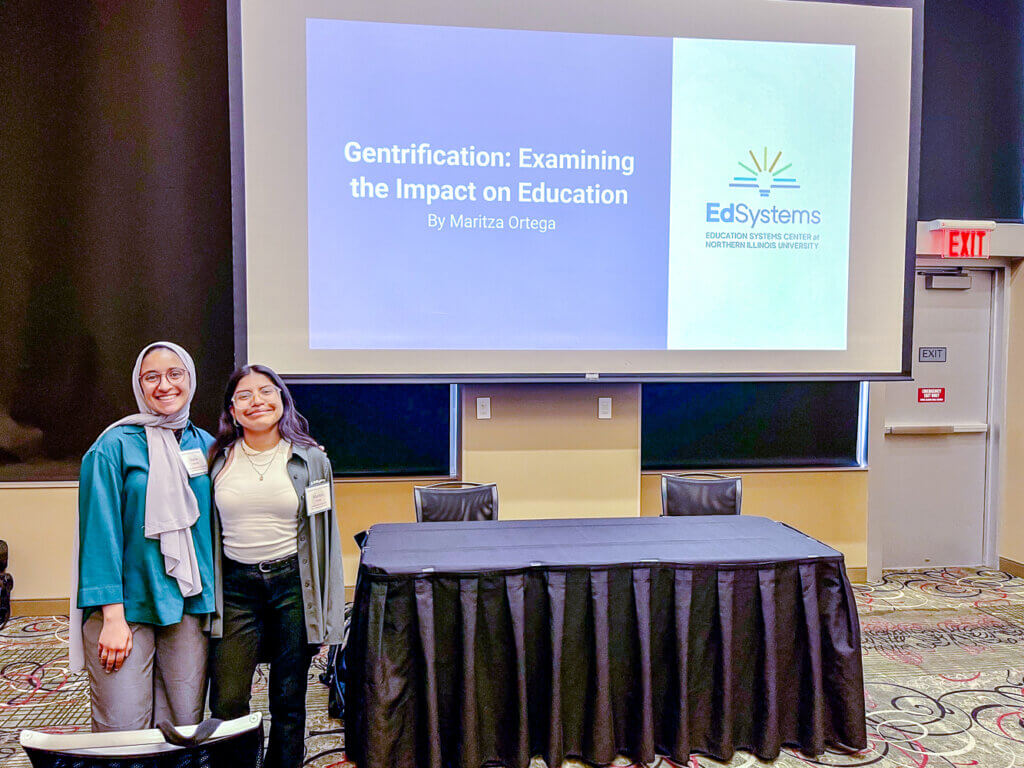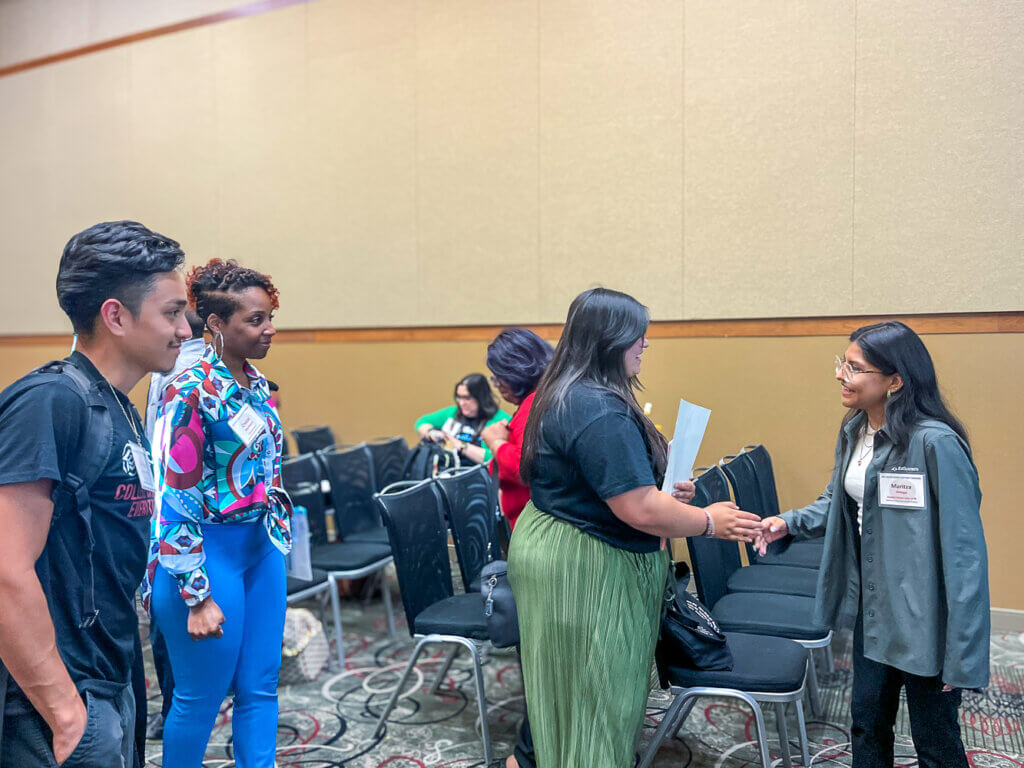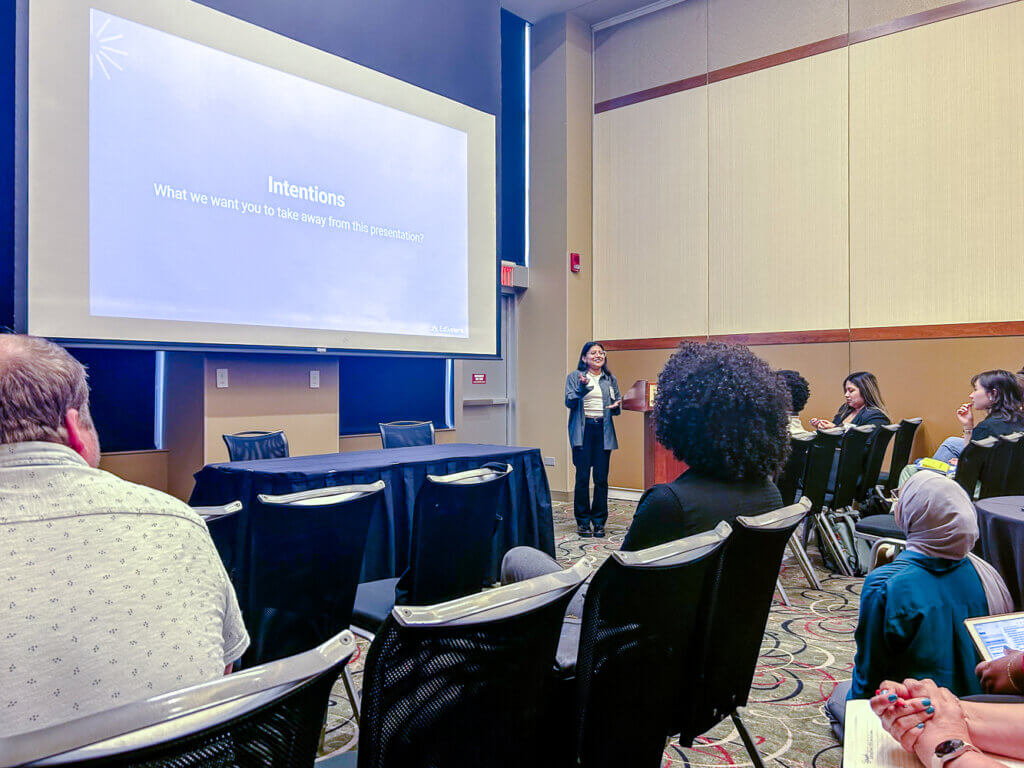This past year, EdSystems’ youth apprenticeship program introduced a new, innovative component to empower young people and drive positive community change while advancing EdSystems’ mission: youth action research. Youth action research equips and enables students to participate in research important to them and their community. This model encourages a dual-impact approach by teaching students valuable research and presentation skills while contributing research to people and causes important to them.
Our model is inspired by the work of the Berkeley YPAR Hub, which highlights that youth action research provides significant benefits by expanding the understanding of who can generate knowledge by recognizing the valuable insights young people gain from their lived experiences. It equips youth with crucial inquiry, evidence-gathering, and presentation skills, aiding their development as proactive community members. This approach provides unique perspectives on youth challenges, identifies critical resources, and fosters sociopolitical and psychological empowerment, motivating young people to address community problems.
In the 2023–24 school year, youth apprentice Maritza Ortega chose to work on a youth action research project examining the impacts of gentrification on education, a topic that is both personally significant and closely related to her own educational experiences. This article discusses our approach to the youth action research model, highlighting examples of Maritza’s engagement.
Student Onboarding
The focus of onboarding is to clarify the goals and introduce the skills needed for meaningful engagement. To empower Maritza in this area, EdSystems provided training on the basics of investigative research, emphasizing how to critically evaluate and interact with various sources of information.
Topic Selection
In youth action research, the inquiry topic is often chosen with student input; however, it is also important to balance this input with organizational goals and expertise to ensure effective mentorship. Maritza expressed an interest in exploring the impacts of gentrification, so the EdSystems team guided her to focus specifically on the educational effects of gentrification, adopting a student-centered approach.
Engaging in Research
Once a topic was selected, Maritza was initially given time to explore it independently. During check-in meetings, the EdSystems team asked clarifying questions to help her better understand the information she was working with and probing questions to encourage her to expand on her findings and explore new directions. Over time, the EdSystems team observed Maritza expand her existing knowledge, integrate it with new information she was exploring, and enhance her ability to search for and analyze data to better understand and explain the impact of gentrification on education. Through continuous feedback, she learned to weave these diverse ideas into a more cohesive narrative.
Presenting Research
The last step of this process is to help students present their research in a way and place that is most conducive to their project goals. The EdSystems team determined that the 2024 College Changes Everything Conference, in which the theme was Community Health, would be a great place for Maritza to showcase her work and connect with people from different communities. Her stated aim for this presentation was to “help the audience gain an appreciation for the challenges faced by students in gentrifying neighborhoods,” and her proposed session was accepted.
In preparation for the conference, Maritza created a presentation and participated in numerous practice and feedback sessions to refine her delivery. At this stage, our focus shifted to enhancing her digital, written, and verbal communication skills.


Contextualizing Research
To ensure that Maritza’s research and the skills she was developing were connected to broader goals, the EdSystems team regularly checked in on her progress and made sure she recognized the value of the skills she was acquiring and how they could benefit her in the future. We also emphasized the importance of taking ownership of her work and highlighted its significance throughout the process.
It’s also crucial to situate student work within a larger context by linking research to community initiatives and connecting students with community stakeholders. This approach ensures that student voices are heard and helps inform future community decisions. In reflection, we wish we had planned for and incorporated this aspect more thoroughly throughout the process. However, when Maritza presented her research, she successfully engaged with stakeholders and integrated this component more effectively.
Taking Action
As part of this process, students should feel empowered to use their findings to advocate for change in their community. We hoped that her presentation would facilitate connections with key stakeholders at the conference and encourage them to leverage their enhanced understanding to positively impact their communities. Maritza left the conference with specific action items to bring back to her community and engaged attendees in discussions about potential solutions. You can find her full presentation and action items on the conference website.
“[Youth action research] is a cyclical process of learning and action – research is done not just for the sake of it but to inform solutions to problems that young people themselves care about.”
– Berkley YPAR Hub
Reflection
At the end of a youth action research cycle, both mentors and youth should reflect on their experiences to assess growth and effectiveness. Mentors can evaluate their guidance and identify areas for improvement, while youth can consolidate their learning and plan for future development. This reflection helps both parties understand the impact of their work and improve future mentoring interactions.
In reflecting on the organization of this process, we learned the importance of selecting topics closely aligned with our areas of expertise to offer more effective mentoring. We also recognized the need to connect students with community stakeholders earlier and to ground their research in a broader context and expertise. Additionally, developing concrete action plans from the start, including specific ways for students to contribute to solutions, can further enhance the impact of their work and ensure their research leads to meaningful outcomes.
When asked about her experience with this process and what she learned, Maritza shared:
“I was grateful and honored to have the chance to work on this project and have it be presented by me. This project really made me realize that I have things I need to work on, but also boosted that I can actually improve on my research and presentation skills. I learned how to dig deep into information, organize my findings, and present everything clearly and confidently. This project not only allowed me help to present what I found in high school but also helped me understand the topic better. This opportunity I had was so wonderful because I got to experience so much and it will definitely help me in the future!”



